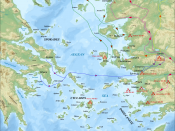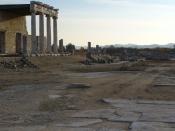The credibility of Herodotus' text is without doubt a source of much debate amongst classical scholars. For almost any given tale within the text, there are arguments from scholars both for and against the historical accuracy of that particular passage. The account of Aristagoras, the tyrant of Miletus, turned rebel leader, is yet another of such debated anecdotes.
One of the few premises that are agreed upon by scholars is that 'the deficiencies of Herodotus, as a historian, if he is measured against modern standards, are notorious' (Chapman 1972, 546). This view is supported by Grundy, as referred to by Evans, who suggests that 'the imperfect character of the information which Herodotus furnishes with regard to the story of the great revolt is so evident that the historian himself must have been conscious of it' (Evans 1976, 25).
There are however some elements of the life of Aristagoras that are generally agreed upon as being historically accurate.
These include the fact that that there was a tyrant of Miletus named Aristagoras, that he was a key political figure in the Ionian Revolt, that he was involved in an unsuccessful military campaign against the island of Naxos prior to the outbreak of the revolt, and that when the Ionians were clearly losing impetus in the Revolt, Aristagoras left Miletus for Myrcinus.
Just how significant a figure Aristagoras in the the leadership of the Ionian Revolt is also a matter of some conjecture. There is no doubt that Mabel Lang is of the opinion that Aristagoras was a selfless patriot dedicated to the liberation of Ionia. In a somewhat romantic explanation of the course of the Revolt, Lang purports that the Ionian Revolt was a revolutionary movement led jointly by Aristagoras and Histiaeus which was defeated less by the Persians and...


